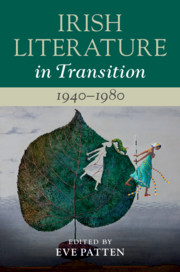Book contents
- Irish Literature in Transition, 1940–1980
- Irish Literature in Transition
- Irish Literature in Transition, 1940–1980
- Copyright page
- Contents
- Contributors
- Series Preface
- General Acknowledgements
- Introduction
- Part I After the War: Ideologies in Transition
- Part II Genres in Transition
- Part III Sex, Politics and Literary Protest
- Chapter 9 Censorship, Law and Literature
- Chapter 10 Sex, Dissent and Irish Fiction: Reading John McGahern
- Chapter 11 History, Memory and Protest in Irish Theatre
- Chapter 12 Violence, Politics and the Poetry of the Troubles
- Part IV Identities and Connections
- Part V Retrospective Frameworks: Criticism in Transition
- Index
Chapter 11 - History, Memory and Protest in Irish Theatre
from Part III - Sex, Politics and Literary Protest
Published online by Cambridge University Press: 28 February 2020
- Irish Literature in Transition, 1940–1980
- Irish Literature in Transition
- Irish Literature in Transition, 1940–1980
- Copyright page
- Contents
- Contributors
- Series Preface
- General Acknowledgements
- Introduction
- Part I After the War: Ideologies in Transition
- Part II Genres in Transition
- Part III Sex, Politics and Literary Protest
- Chapter 9 Censorship, Law and Literature
- Chapter 10 Sex, Dissent and Irish Fiction: Reading John McGahern
- Chapter 11 History, Memory and Protest in Irish Theatre
- Chapter 12 Violence, Politics and the Poetry of the Troubles
- Part IV Identities and Connections
- Part V Retrospective Frameworks: Criticism in Transition
- Index
Summary
With reference to current developments in memory studies, this chapter examines the role and status of Irish theatre in relation to debates about history, memory, and protest in the 1960s and 1970s. Reading the plays of Brian Friel, Hugh Leonard, Thomas Kilroy, Tom Murphy, Richard Johnson and Máiréad ní Ghráda, the chapter argues that memory performed a crucial function in response to the particular social and cultural transitions in these decades. In the light of the culture of commemoration that emerged in and around 1966, writers confronted the difficulties of responding artistically to the violent history of the island of Ireland. Although different methods are adopted in these plays – Friel’s realism, Kilroy’s experimentalism, Leonard’s satire – they are unified by a common concern with memory, and the ways in which the past becomes material for present-day agendas. Beyond this probing of the historical record, there is an exposure of contemporary Ireland, with dramas staging a scathing view of the current moment. Murphy and Friel’s plays express the dissatisfactions of the young male generation with the possibilities for freedom in the Irish Republic, whereas ní Ghráda and Johnson critique the impact of Ireland’s oppressive social rules on women and children.
Keywords
- Type
- Chapter
- Information
- Irish Literature in Transition, 1940–1980 , pp. 201 - 215Publisher: Cambridge University PressPrint publication year: 2020

